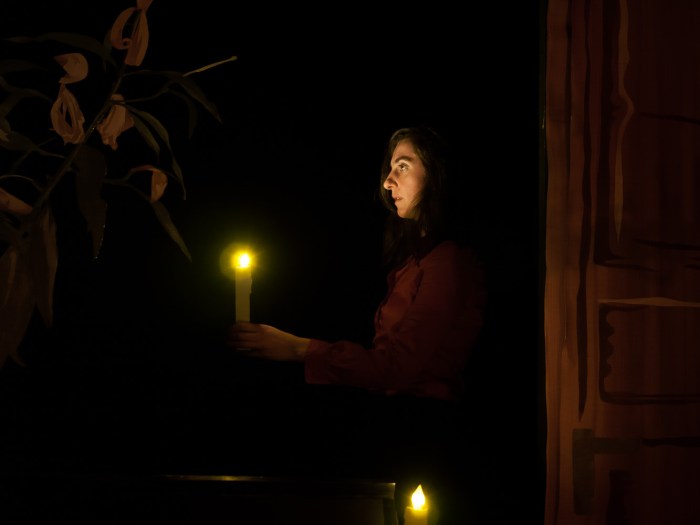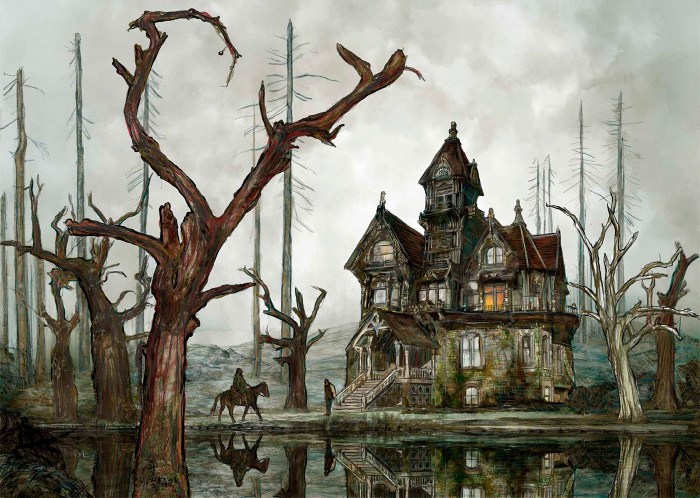The gloomy mood in the fall of the House of Usher permeates every aspect of Edgar Allan Poe’s classic tale, creating an atmosphere of unease and despair. The dreary landscape, decaying mansion, and supernatural elements all contribute to a sense of impending doom that envelops the characters and readers alike.
This exploration delves into the symbolism and atmosphere of the story, examining how Poe’s masterful use of language and imagery creates a haunting and unforgettable experience.
The Gloomy Atmosphere of the Fall Season

The fall season in “The Fall of the House of Usher” is depicted as a dreary and melancholic time, characterized by oppressive weather, barren landscapes, and a pervasive sense of decay. These descriptions contribute to the overall gloomy mood of the story, creating an atmosphere of despair and foreboding.
The Weather and Landscape
- The story opens with a description of “dull, dark, and soundless day in the autumn of the year,” setting the tone for the gloomy atmosphere that permeates the rest of the story.
- The landscape is described as “waste land” and “a realm of melancholy,” with “dreary trees” and “sullen skies” creating a sense of desolation and emptiness.
The Decaying Mansion
The Usher mansion itself is a symbol of the gloom and decay that permeates the story. Its “vacant eye-like windows” and “bleak walls” suggest a sense of abandonment and neglect, while the “rank sedges” and “tangles of wild vines” that surround it add to the oppressive atmosphere.
The Physical and Psychological Manifestations of Gloom
The gloomy atmosphere of the fall season has a profound impact on the physical and psychological states of the characters in the story. The oppressive environment takes a toll on their health, both physically and mentally.
Physical Manifestations
- Roderick Usher, the narrator’s friend, is described as “hypochondriac” and “nervous to a degree of positive suffering.” The gloomy atmosphere exacerbates his physical ailments.
- The narrator himself is affected by the oppressive environment, experiencing “an icy chill” and “a sensation of suffocation” as he explores the Usher mansion.
Psychological Manifestations
The gloomy atmosphere also has a significant impact on the characters’ mental states. Roderick Usher becomes increasingly withdrawn and paranoid, while the narrator experiences a sense of unease and dread as the story progresses.
The Symbolism of Gloom and Decay

The gloomy atmosphere of the fall season and the decaying mansion are not merely descriptive elements in the story but also serve as powerful symbols of the characters’ inner turmoil and the decline of the Usher family.
The Gloomy Atmosphere, Gloomy mood in the fall of the house of usher
The oppressive weather and barren landscape reflect the characters’ emotional states of despair and hopelessness. The gloomy atmosphere symbolizes the characters’ inability to escape their fate and the inevitability of their downfall.
The Decaying Mansion
The Usher mansion is a symbol of the decay and decline of the Usher family. Its crumbling walls and overgrown surroundings represent the family’s fading fortunes and impending doom.
The Contrast Between Light and Darkness

Despite the overall gloominess of the story, there are moments of light and hope that provide a stark contrast to the despair and darkness. These moments highlight the characters’ struggle against the forces of darkness and their eventual succumb to them.
Moments of Light
- The narrator’s initial arrival at the Usher mansion is greeted by a “faint glimmer” of light, suggesting a glimmer of hope amidst the gloom.
- The narrator’s conversations with Roderick Usher provide moments of intellectual stimulation and connection, offering a respite from the oppressive atmosphere.
Moments of Darkness
However, these moments of light are ultimately overshadowed by the darkness that pervades the story. Roderick Usher’s mental state deteriorates, and the narrator’s sense of dread intensifies as the story progresses.
The Role of the Supernatural in the Gloomy Atmosphere
The supernatural elements in the story contribute significantly to the gloomy atmosphere. The presence of ghosts, visions, and other supernatural phenomena creates a sense of unease and dread, reflecting the characters’ inner fears and anxieties.
The Supernatural and the Characters’ Fears
- The ghost of Lady Madeline represents Roderick Usher’s fear of his own mortality and the inevitable decline of his family.
- The visions that the narrator experiences foreshadow the tragic events that will unfold, creating a sense of impending doom.
The Supernatural and the Atmosphere
The supernatural elements also contribute to the oppressive atmosphere of the story. The ghostly apparitions and eerie noises create a sense of unease and make the mansion feel like a haunted place.
Expert Answers: Gloomy Mood In The Fall Of The House Of Usher
What is the significance of the fall season in the story?
The fall season symbolizes decay and decline, mirroring the crumbling state of the Usher family and their ancestral home.
How does the gloomy atmosphere affect the characters?
The oppressive atmosphere weighs heavily on the characters, exacerbating their mental and physical ailments.
What is the role of the supernatural in the story?
The supernatural elements, such as the ghosts and visions, reflect the characters’ inner fears and anxieties, contributing to the sense of unease and dread.